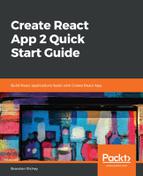First, head on over to the failing test suite, src/TodoList/TodoList.test.js, where we will need to create something in Jest called a mock library. A mock library is basically just a way for us to tell Jest that we need to fake the behavior of a particular import module so that, whenever it is used, our fake mock functions will be used instead. This will allow us to mock the behavior of the entire service library that we wrote, allowing us to test our components and verify functionality without needing tests that actually make calls to some backend API somewhere!
We'll start the top of our test file, underneath our import statements, by adding the library mock and three mock functions:
jest.mock("../TodoService", () => ({
fetchTodos: jest.fn().mockReturnValue({ status: 200, todos: [] }),
createTodo: jest.fn().mockReturnValue({ status: 200, todos: [] }),
deleteTodo: jest.fn().mockReturnValue({ status: 200, todos: [] })
}));
We're writing these in a way that the functions will always work, always return an empty list of todos, and will always return a fake HTTP status 200 code! With that out of the way, we can clean up our failing tests.
The two tests that are failing are doing so because the behavior is erratic when we're dealing with non-async tests that deal with async functionality! We can instead write our tests—similar to how we write the rest of our function calls—to be async functions! Think about the structure of a test declaration:
it("does some thing", () => {
// Do some work here
});
If we wanted to instead make that test async-capable, we would instead write our test declaration as follows:
it("does some thing", async () => {
// Do some work here
});
Bearing that in mind, let's take a look at the corrected function:
it("adds another Todo when the addTodo function is called", async () => {
const before = component.find(Todo).length;
await component.instance().addTodo("New Item");
component.update();
const after = component.find(Todo).length;
expect(after).toBeGreaterThan(before);
});
It's not dramatically different from the test we had previously, with the addition of the call to addTodo() requiring an await statement. Now let's take a look at our test for removeTodo():
it("removes a Todo from the list when the remove Todo function is called", async () => {
const before = component.find(Todo).length;
const removeMe = component.state("items")[0];
await component.instance().removeTodo(removeMe.id);
component.update();
const after = component.find(Todo).length;
expect(after).toBeLessThan(before);
});
You might get an error message about the first test, the test where it tries to render a component without crashing. Our new async/await additions make this test no longer viable, so just delete it! Run the tests now, and we should see the follows:
PASS src/Todo.test.js
PASS src/App/App.test.js
PASS src/TodoList/TodoList.test.js
PASS src/NewTodo/NewTodo.test.js
PASS src/Todo/Todo.test.js
Test Suites: 4 passed, 4 total
Tests: 21 passed, 21 total
Snapshots: 3 passed, 3 total
Time: 5.596s
Ran all test suites.
There we are, back to a fully-passing suite of tests!
